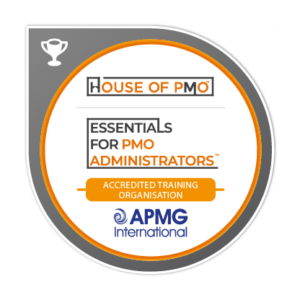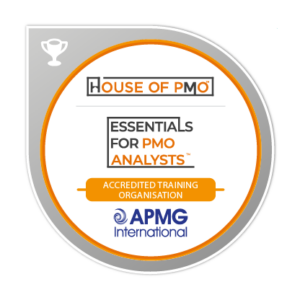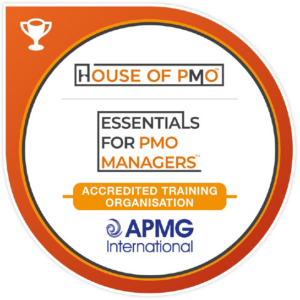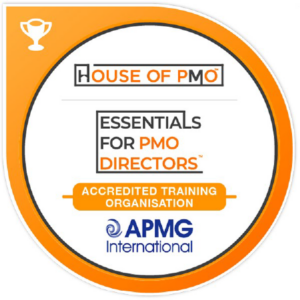
When asked to write about my five favourite books, I looked round at my overladen bookcase and wondered where to start. My trusty app which keeps a track of all my books tells me the spine count is up to 1057, but that doesn’t count Kindle books or PDFs!
I think it’s fair to say I love books and still prefer to have a physical book in my hands, even though I do love my Kindle.
So, it’s fair to say that I have a few to choose from.
I also recognise that many of my books are written by friends and colleagues, and I’m in danger of offending or alienating all of them, but I’m not letting that sway my choice.
I immediately discounted three PMO books that I’ve had an active role in – the P3O Best Management Practice (found in the P3O® Certifications), The PMO Competency Framework and the PMO Service Catalogue (found in the Essentials Certifications) – all of which are excellent, and I use regularly in my work.
The following five books are those that switched on a lightbulb in my head when I first read them, that hasn’t ever gone out and continues to shine a light on/ provide insight into my day-to-day life and work.
1 – The 7 Habits of Highly Effective People, Stephen R Covey
I am in great danger of becoming quite evangelical about this book. I think the seven habits are a recipe for life, setting up a PMO and everything in between!
For those of you who can’t list them by heart, they are:
- #1 – Be proactive – take responsibility and take the initiative
- #2 – Begin with the end in mind – have a vision for the future so you can work towards it
- #3 – Put first things first – focus on what’s important
- #4 – Think win-win – seek mutual benefit in relationships and interactions with others
- #5 – Seek first to understand, then to be understood – first, really listen before jumping in with your expections
- #6 – Synergise – work with others to get a better outcome
- #7 – Sharpen the saw – take time for self-renewal and self-improvement
2 – Brain Rules, John Medina
Although it may not be at the top of many trainers’ ‘books to read’ list, it provides some great insights (that word again) on how brains work. Armed with that knowledge, it really helps in the design and delivery of effective training – ensuring the delegates do more than remember the words to pass an exam, but truly understand the concepts and principles behind those words so they can recall and use them in back in the workplace for years to come.
Again, for those who don’t know them (and because I do like a list!):
- #1 – Exercise – exercise boosts brain power
- #2 – Survival – the human brain evolved too
- #3 – Wiring – every brain is wired differently
- #4 – Attention – we don’t pay attention to boring things
- #5 – Short-term memory – repeat to remember
- #6 – Long-term memory – remember to repeat
- #7 – Sleep – sleep well, think well
- #8 – Stress – stressed brains don’t learn the same way
- #9 – Sensory integration – stimulate more of the senses
- #10 – Vision – vision trumps all other senses
- #11 – Gender – male and female brains are different
- #12 – Exploration – we are powerful and natural explorers
3 – Images of Projects, Mark Winter and Tony Szczepanek
As a PMO professional, one of our aims is often to embed consistency in project delivery within our organisation to drive efficiency and effectiveness. This book takes seven different perspectives of projects that help us understand how the culture of each project can be different and provides insights (that word again) on how best the PMO can support the project.
When writing the PMO competency framework, the definition of each competence finishes with the words ‘to help projects succeed’ – this book reinforces the fact that ‘one size fits nobody’ (one of my husband’s favourite sayings) and we may need to change our approach to engage with those working on the projects.
Of course, you want the list of the 7 images:
- #1 – Projects as social processes
- #2 – Projects as political processes
- #3 – Projects as intervention processes
- #4 – Projects as a value creation
- #5 – Projects as development processes
- #6 – Projects as temporary organisations
- #7 – Projects as change processes
4 – Guide to Developing the Project Business Case, HM Treasury and the Welsh Government
This is the text underpinning the Better Business Cases certification, often called the Five Cast Model. We are taught from our very brush with projects, that every project has a Business Case. In PMOs, this is often the first template we create, however, many don’t provide the process by which the project team can determine the information that needs to go into the business case. The text provides 10 steps and 25 actions on how to do just that.
We seem to be on a theme so it would be rude not to share the list!
- #1 – Determining the strategic context
- #2 – Making the case for change
- #3 – Exploring the preferred way forward
- #4 – Determining potential value for money
- #5 – Preparing for the potential deal
- #6 – Ascertaining affordability and funding requirement
- #7 – Planning for successful delivery
- #8 – Procuring the vfm solution
- #9 – Contracting for the deal
- #10 – Ensuring successful delivery
Although written by central government, with some tailoring, it can apply to public, private and third sector organisations.
5 – The Cynefin Mini-Book, Greg Brougham
I was introduced to the Cynefin model a few years ago, and it is another book that provides a framework that helps us understand why doing the same thing in different environments doesn’t work – why having a PMO model and delivery approach worked fantastically well in one organisation but doesn’t even get off the ground in another. The framework also provides some helpful approaches, that we’ve included in the House of PMO Essentials certification for PMO Managers.
Although I’ve got another, more in depth book on Cynefin, I love this mini book as it provides sufficient information without getting too technical.
So, there are my top 5 – many of which have stayed in my top 10 for many years. What are yours?
Enjoying Our Blog?
Sign up and receive all our articles (we’ll send you an update once a week!) plus special offers and events:











